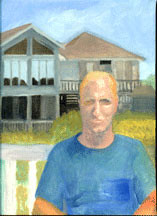Thursday, November 24, 2005
Friday, November 11, 2005
William H. Hankin Sr.
Veterans Day
Today I remember my father who served in both WWII and Korea. He died in 1957 at the age of 44. He inspired me to make art.
Today I remember my father who served in both WWII and Korea. He died in 1957 at the age of 44. He inspired me to make art.
Sculpture lesson 2
Armature
The first step in making a sculpture is to build and pose the armature of the figure. The material used depends on the scale of the figure. Aluminum wire for small sculptures, steel pipe for large. Some combination of the two with wood, foam or other fillers can be used. Posing the armature should follow the proportions and axial direction of the major forms of the figure.
The first step in making a sculpture is to build and pose the armature of the figure. The material used depends on the scale of the figure. Aluminum wire for small sculptures, steel pipe for large. Some combination of the two with wood, foam or other fillers can be used. Posing the armature should follow the proportions and axial direction of the major forms of the figure.
Thursday, November 10, 2005
Sculpture lesson
Parting line
This is a mold makers term that is the line around any form that divides it in two or more parts. This can best be seen on some French bronze casts. Making molds with rubber has made this a lost art term because it is not required with flexible molds. The ceramics industry still uses plaster molds and a mold maker needs to find the "parting line" The more complicated the form the more mold sections and "parting lines." A simple way to find a parting line is to shave a pencil flat down to the middle core and then draw it around the form holding it in the same angle all the way around the form. A ball would have a line around it that would be like the equator.
This is a mold makers term that is the line around any form that divides it in two or more parts. This can best be seen on some French bronze casts. Making molds with rubber has made this a lost art term because it is not required with flexible molds. The ceramics industry still uses plaster molds and a mold maker needs to find the "parting line" The more complicated the form the more mold sections and "parting lines." A simple way to find a parting line is to shave a pencil flat down to the middle core and then draw it around the form holding it in the same angle all the way around the form. A ball would have a line around it that would be like the equator.

